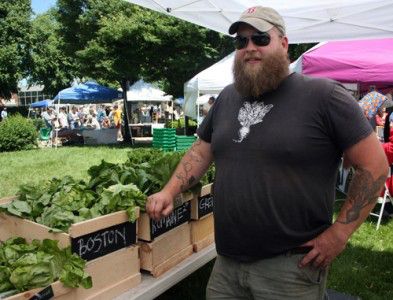
To promote local farms and healthy eating habits, the Massachusetts Department of Agricultural Resources teamed up with the Massachusetts Farm to School Project to encourage high schools and colleges to buy locally.
The Massachusetts House of Representatives and Senate passed resolutions earlier this month to declare that supporting local farms and eating locally grown produce affects the community in a positive way.
“One of the best ways for kids to become lifelong eaters of healthy food is to [serve them] local food,” said Kelly Erwin, director of the Massachusetts Farm to School Project. “Focusing on the local aspect of the food is like offering a treat, and it’s something that the adults and kids can share together.”
She said that fresh, healthy food that’s just picked tastes better than other produce, so kids will eat it.
“From the farmer’s perspective, it’s about sustainable relationships— a mix of customers, from public schools to private institutions,” Erwin said.
To date, Erwin said that about 250 public schools, private schools and colleges in Mass. are purchasing local foods, and about 110 farms are directly selling their products to schools across the state.
Thirty to 40 more farmers are selling indirectly to schools through distributers, she added.
In a 2010 survey, of 51 farmers interviewed by the Mass. Farm to School Project, 55 percent of farmers said that selling to Mass. schools was profitable for their farm. Twenty-seven percent said it was somewhat profitable, while 7 percent said it was not and 2 percent said unknown.
One of the complaints the survey found was that delivery for the farmers was not convenient unless they had one drop-off location for every school district.
However, many farmers praised the project.
“Selling to schools gives us exposure in the community that helps sales at our farm stand and farmers markets,” said one farmer in a comment on the survey.
As one of the 250 schools participating in the Mass. Farm to School Project, Boston University boasts a wide variety of sources for its foods, said Sabrina Pashtan, the sustainability coordinator for BU Dining Services.
BU purchases seasonal local produce from 45 farms and 130 different producers through three distributors, she said. “Local” in this case is defined by anywhere within a 250-mile radius.
“Summer and fall are great times of the year for local produce,” Pashtan said, “and in the winter when not much is growing through the snow, we offer some local apples and squash, as well as greenhouse-grown items such as sprouts from Rochester, Mass. and tomatoes from Madison, Maine.”
Dining Services buys locally to support New England agriculture and the local economy to preserve open space in the region and reduce greenhouse-gas emissions, she said.
“We also think it is pretty tasty! By purchasing locally, we give students the opportunity to experience New England seasonality— what’s growing and when,” Pashtan said.
Lauren Davis, a junior in College of Arts and Sciences, said she likes when local produce is served in the dining halls.
“I like that [BU] is supporting local farmers as opposed to outsourcing it to other farms from an area that’s more far away,” she said. “[These farms] would need to keep the foods fresh longer by using pesticides and genetically engineering the food, which isn’t good for anybody.”
College of Communication freshman Ilana Berman said she eats in the dining halls every day, and appreciates the availability of fresh fruits and vegetables.
“In our dorm we even have a basket where we can store fruit we take back from the dining hall,” she said. “It’s a healthy alternative to the typical snack…Local foods tend to be of the best quality.”



















































































































